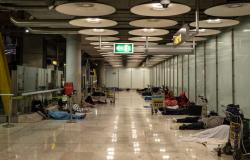The Ministry of Justice has tightened the conditions to register in the country the children born by subrogated gestation abroad. As of May 1, 2025, it is no longer possible to directly register these births in the Spanish Civil Registry. Even if there are judicial resolutions that support them in the country where the procedure was carried out.
This decision is based on an official instruction published in the Official State Gazette (BOE) and a ruling by the Supreme Court issued in December 2024. This ruling maintains that the surrogacy is contrary to the Spanish public order. Which violates the dignity of pregnant woman and compromises the best interests of the child.
According to the new regulation, so that a child born through this method is legally recognized in Spain, the parents must prove a direct biological link or initiate an adoption process. So, those who have appealed to the subrogation in countries where it is legal, will have to carry out judicial procedures so that the minor obtains recognition in Spain.
Spain, pioneer in the prohibition
The Professor of Civil Law of the Rey Juan Carlos University of Madrid, Javier López-Galiacho, explains in conversation with Elcierredigital.com that “Spain has been prohibiting this practice for more than three decades. Already in the assisted reproduction law of 1988, a pioneer norm in Europe was established that subrogated gestation contracts lack legal validity. The law was reinforced in 2006, reiterating that any agreement of this type is void of full right.”
“Despite the prohibition, for years there has been a kind of law fraud: Spanish citizens have gone to countries such as the United States or Canada, where these types of contracts are legal and cost between 25,000 and 150,000 dollars”he adds.
López-Galiacho explains that “once the children were born, they were registered in the consular registry of the embassies, in some cases even with foreign judicial sentences that recognized the affiliation of the campers as legal parents. Welcome examples are those of Miguel Bosé or Ricky Martin, whose children were born by subrogated gestation abroad and were legally recorded in Spain.”
“However, this legal vacuum has begun to close. In December 2024, the Supreme Court issued a key sentence. It acknowledged that it had been acting with contradictions against a practice that violates public order, the dignity of women and the interest of the minor. This decision supported the position that the Ministry of Justice has long defended, aligned with the government parties and its partners (PSOE, we That Spain was participating in a market that commercializes the body of women, “he adds.

| EP
As of May 1, 2025, he explains, “an instruction that prevents the automatic registration of children born by subrogated pregnancy abroad enters into force. Even if there is a sentence in the country of origin. Spain does not recognize that affiliation. Now there are only two possible ways to register those minors in the Civil Registry. The biological route, if one of the parents demonstrates genetic affiliation, or the adopted path, through a legal process of adoption, with full legal effects“.
The Government shows its rejection of rent bellies
With these restrictions, the Government reaffirms its rejection towards subrogated gestation, prohibited since 2006 and cataloged as a form of reproductive violence since the reform of the sexual and reproductive health law in 2023. However, various associations that support this practice have expressed concern, considering that new measures could stigmatize families and, nevertheless, not prevent the subrogated gestation from being carried out outside the legal framework.
The Ministry has closed the most direct pathways to legalize the affiliation of these children, forcing more complex procedures such as genetic kinship or adoption tests.
“Modern exploitation mode”
Rent beams have become one of the most controversial debates around reproductive rights. Although some defend practice as a legitimate alternative to form a family, “As if someone for having a great heritage was entitled to be a father or mother “explains a leader of a political formation contrary to the procedure, various feminist, legal and human rights organizations warn about the consequences that this practice can have for pregnant women, especially in contexts of economic vulnerability or lack of personal autonomy.
These groups argue that subrogation is not a form of reproductive freedom, but a “Modern mode of exploitation”, with legal, ethical and social implications that directly affect the dignity of women.
One of the main arguments is that subrogated pregnancy turns the female body into an object of commercial transaction. The ability to gestate becomes a “service” that is purchased, above all, in cases where there is financial compensation, which reinforces the possibility of reproductive exploitation, when treating pregnancy as a contractual product.

| EP
The process usually implies an imbalance of power. Women who are offered as pregnant women usually do so by economic necessity, while those who hire the service, the guests, usually have greater economic resources. This raises doubts about real and free consent, since many women may feel forced by their personal situation to accept unfavorable conditions.
Institutions such as European Parliament have warned that subrogation can violate fundamental rights of women, including the right to dignity, physical and moral integrity, no longer be instrumentalized for purposes outside their will. By turning the pregnant woman into a medium for an end, the baby’s delivery, her rights are diluted as an autonomous subject.
The practice also opens complex legal questions: what happens if the pregnant woman changes her mind and wants to keep the child? What happens if the camper parents disregard the baby?
In many contracts, the woman renounces in advance to any right over the minor, which can contradict fundamental principles of civil and family law.





